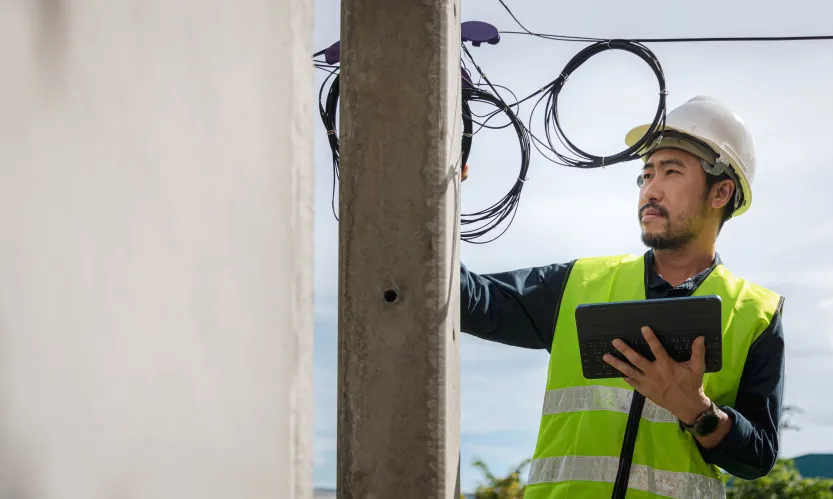Artificial intelligence is transforming industries across the board — and construction is no exception.
From streamlining back-office operations to improving cost management, AI presents enormous opportunities for innovation and efficiency in construction. However, like any tool, its adoption in construction requires careful consideration. Certain applications of AI can deliver measurable benefits, while others may not yet justify the risks or costs.
If you’re strategizing the role of AI in your construction business, this blog post is for you. We'll go over:
Where construction companies should leverage AI to optimize their processes Where construction companies should be tentative on using AI Let's dive in!
Where Construction Companies Should Be Using AI AI is capable of driving substantial change in construction, an industry historically resistant to adopting cutting-edge technologies. The key lies in strategically selecting areas where AI can create value through efficiency, cost reduction, and streamlined operations.
Check out the following examples of where AI shines in construction:
1. Email Triage Many workers in the construction industry struggle with effectively managing their inboxes. Even with a dedicated team, it's easy to lose track of high-priority emails.
That's where AI-powered email triage can help. Quality AI tools can integrate with your email inbox of choice, parse through your emails on a regular cadence, and automatically capture, categorize, and prioritize emails based on their contents.
Workers can even configure intelligent auto-replies to emails with simple queries or have AI automatically create service tickets for actionable items in tools like Viewpoint Vista.
By automating email triage, workers can spend less time on repetitive office minutia so they can focus on executing their latest projects.
2. Contract and Vendor Management Effective contract and vendor management is essential in the construction industry to ensure projects are completed on time, within budget, and to the required quality standards. This process involves:
Drafting and negotiating contracts Setting clear terms and conditions Establishing communication and performance expectations for vendors and subcontractors AI-powered automation can help streamline contract, submittal, and vendor management. Workers can use AI tools to:
Automate data extraction and validation for change orders Receive regular alerts for compliance checks to initiate corrective actions Manage submittals for multiple projects using our dashboards and reporting tools Automate data collection and analysis of vendor performance. Proper management reduces risks, ensures compliance with legal and regulatory requirements, and fosters strong, reliable partnerships. By automating some of the processes involved, construction managers can streamline project workflows and avoid delays.
3. Field Worker Management Field workers of any kind are unable to do their job well if they regularly have to return to the office to obtain information or file a ticket. That's where deploying intelligent AI Agents on an app can be particularly helpful for construction workers out in the field.
Instead of returning to the office, staff can implement an AI Agent trained on a large database of construction knowledge. This enables field workers to ask questions while on the job and get immediate responses from validated sources.
Top-quality AI Agents can even integrate with Viewpoint Vista, enabling workers to set up support tickets in minutes without having to leave their site.
By streamlining these processes, construction businesses can improve efficiency, reduce downtime, and enhance overall service delivery.
4. Project Planning and Design Construction businesses can leverage AI-powered tools to create a construction planning AI Agent. By training it on vast amounts of data, it can streamline initial project planning by recommending design improvements, estimating budgets, and optimizing resource utilization. Machine learning algorithms can simulate various design scenarios to identify the most efficient options before the project even begins.
5. Cost Forecasting and Risk Management Construction projects often face cost overruns due to unexpected variables. AI-powered solutions can analyze historical project data, market trends, and current site conditions to provide accurate cost forecasts and assess risks proactively.
By integrating AI into these parts of the workflow, construction companies can see immediate savings in time and resources while reducing error margins significantly.
Where Construction Companies Should Avoid AI (For Now) Despite its potential, AI is not a one-size-fits-all solution. Misapplying it can result in ineffective processes, wasted resources, and diminished trust in its value.
Here are areas where construction companies should tread cautiously:
1. Unstructured or Highly Complex Tasks While AI handles repetitive tasks and structured data exceptionally well, it should not be used alone for more unstructured processes requiring human intuition or creativity.
While you can certainly leverage AI as a trained consultant for tasks like negotiating complex construction contracts, it should only act as a supplement, with decision-making ultimately being left to experienced professionals.
2. Creative or Aesthetic Design AI excels at functional design and optimization, but it has limitations in creating aesthetically driven, innovative architectural concepts. Human designers bring contextual knowledge, cultural nuance, and artistic flair to projects. AI cannot currently replicate the ideation and thinking part of the design process for construction.
3. Adapting to Rapidly Changing Project Variables AI systems perform best in environments where they can learn from historical data. However, construction sites are unpredictable, and rapidly changing variables like sudden regulatory changes or labour strikes can render AI recommendations irrelevant.
Unless you're regularly and quickly providing your AI with new datasets, your AI will be unable to meet the demands of your teams.
4. Handling Ethical or Safety Decisions AI cannot navigate ethical dilemmas or make critical safety decisions on-site. Those should always be managed by a real human who can balance nuanced knowledge of the situation with the bigger picture. Even with large, valuable datasets, trusting AI for ethical decisions is not a good plan and could easily get you in trouble with your insurance provider.
For example, determining whether to proceed with a potentially risky task requires human oversight, as AI cannot fully comprehend the moral, legal, and situational nuances involved in such decisions.
Leveraging the Right AI Tools and Partners for Construction Construction companies can and should leverage AI appropriately to optimize their operations and reduce costs. The path to successfully using AI isn’t about the technology itself. It’s also about understanding when and where to use it effectively.
Partnering with experts who understand both business processes and the capabilities of AI is critical. At SimplyAsk, we help organizations like construction companies optimize their operations through AI-powered automation enterprise consulting services.
If you're looking for an easy-to-use, no-code tool that makes automating with AI easy, Symphona, Symphona also easily integrates with popular construction tools like Procore and Viewpoint Vista, so you don't need to waste time rearranging your tech stack.
Enable your teams to perform better with AI. Get started with Symphona today!
.svg)

.svg)


.svg)





.avif)
.avif)





.svg)
.jpg)






.svg)

.svg)
.svg)
